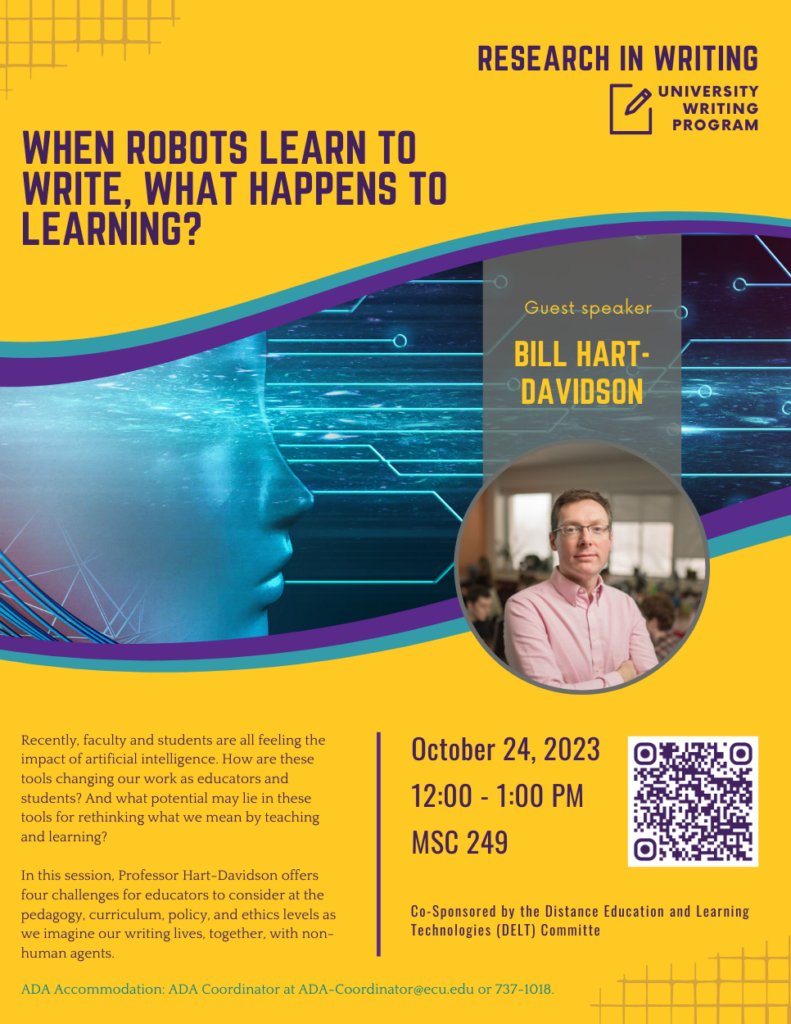Research in Writing: Artificial Intelligence
Exploring AI with Professor Bill Hart-Davidson
The University Writing Program will kick off its Research in Writing series in 2023 with our first invited speaker, Professor Bill Hart-Davidson (Michigan State), who will present a noon talk on the impacts of artificial intelligence (AI) and large language models (LLM) on teaching, research, and higher education policy. Dr. Hart-Davidson’s noon presentation will be followed by an afternoon workshop where faculty and graduate teaching assistants can think carefully and critically about their classrooms and how they can teach more effectively with/through/beside AI/LLMs.
This presentation is co-sponsored by the Distance Education and Learning Technologies (DELT) Committee.
 When Robots Learn to Write, What Happens to Learning?
When Robots Learn to Write, What Happens to Learning?
Four Proposals for AI Tools in Teaching & Learning
October 24, 2024
12:00 – 1:00 pm
249 Main Campus Student Center
The availability of AI and Large-Language Models in particular has rapidly become a disruptive force in education over the last few months. What happened recently to make these models more powerful and more widely accessible? what are the capabilities of these models and how can they change teaching and learning?
In this session, Professor Hart-Davidson offers some responses to these questions from his point of view as a researcher and maker of writing technologies, and as a teacher and administrator. He will also offer four proposed changes for educators to consider at the pedagogy, curriculum, policy and ethics levels as we imagine our writing lives, together, with non-human agents.
Each of these areas will be the basis for discussion and some hands-on creative work applicable to our contemporary classrooms and students in the workshop to follow.
AI in the Loop: New Practices, Policies and Ethical Considerations
October 24, 2023
2:00 – 3:30 PM
1418 Main Campus Library
In this hands-on session, educators will work to create values-centered responses to each of the four areas below:
- Writing Practice: Evaluate existing assignments and evaluation in one of two categories — “learning to write” and “writing to learn” — and create modifications to plan for AI as part of students’ work.
- Practice Routines: Consider curriculum changes that emphasize review and revision in addition to drafting as valuable learning interventions and sources of learning indicators in writing to learn and learning to write settings.
- Cultures of Consent and Disclosure: Consider policy changes that address the use of AI in academic work, broadly, and that preserve our commitments to integrity, honesty, and quality by making consent and disclosure part of our routine.
- Access and Equity: Consider long(er) term effects of AI in teaching, learning, and scholarship with an eye on the potential for asymmetries in access to widen disparity and inequity.
In each session we’ll begin by working to identify key values that we want to keep stable. We will identify indicators of learning and quality scholarship as they are reflected in existing practice. Then we’ll imagine new indicators that might be useful as non-human agents join our workflows.
Participants will share ideas for revised assignments, curricula, policy, and ethical guidelines based on their groups’ discussion.
Short Bio
Bill Hart-Davidson, Ph.D., is a Professor in the Department of Writing, Rhetoric, and American Cultures, a Senior Researcher in the Writing, Information and Digital Experience (WIDE) Research Center and Associate Dean of Research and Graduate Education in the College of Arts & Letters at Michigan State University. He has published over 100 articles and book chapters and is co-inventor of Eli Review, a software service that supports peer learning in writing, feedback, and revision. Bill’s research and teaching focus on writing and feedback in both school and professional settings.
